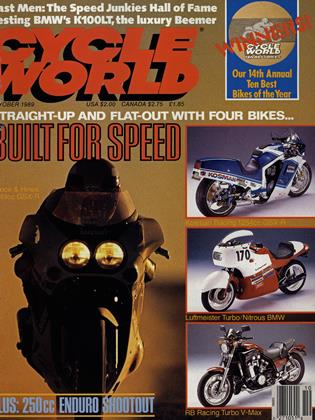RB RACING TURBO V-MAX
TERRIFIC, BUT TROUBLED
POTENTIAL IS A WONDERFUL THING, UNLESS IT isn’t met. Then it’s about as useful as a motorcycle that isn’t ridden, as music that isn’t played. So it is with the turbocharged, intercooled Yamaha V-Max delivered to us by RB Racing (1625 W. 134th St., Gardena, CA 90249; 213/515-5720). This bike seems, at least in theory, built for Cycle World's pet philosophy, which is that too much horsepower is just about enough.
The problem is that development of any device, whether it’s a computer, an airplane or a racebike, proceeds on a curve. The initial stages of the curve are very steep indeed, and as the device nears perfection and as the developers gain knowledge, the curve levels off. The thing is, steep inclines are tough to climb, and that’s especially true when the unit being developed is a complex one. And that, in a nutshell, was the problem facing Bob Behn, the brains behind RB Racing.
Behn whips his turbo/intercooler kits onto a wide variety of motorcycles, and he had one of them, a bike which belonged to a customer, lined up as his “Built for Speed” entry. And then the bike’s owner got cold feet. So, we all agreed that Turbo-Max sounded like a fine replacement. Trouble was, Behn was in the early stages of building his first one. And there were glitches which remained to be smoothed out. That smoothing didn’t happen, as time and our testing and deadline schedule advanced far more rapidly than did the bike’s development. So we are left with promise instead of performance.
Turbo-Max is a good idea, though, and a good effort, made even better by the cost of the performance the bike eventually should deliver. Because he figures 150 cubic-feet-per-minute of air is required for every 100 horsepower developed per lOOOcc, and because the IHI RHB6 turbocharger he uses blows 450 cfm, Behn estimates a theoretical 300 horsepower is possible from his bike. For street use, though, Behn limits boost to 15 pounds of manifold pressure, yielding a still-muscular 235 to 250 horsepower. And with the RB turbo kit’s $3295 price, that means each of those 250 horses costs about $13, far and away the lowest horsepower-per-dollar figure delivered by any of these four bikes.
Now, Behn’s kit is no simple bit of hardware hung on the bike with a Crescent wrench, screwdriver and 30 minutes worth of work. What you get for your money is a turbocharger, headers, intercoolers, a waste gate, fuel-pressure regulators, boost control dial and materials to modify the stock carburetors so they’ll work in a blow-through configuration. So, if this turbo system sounds like it’s just right for you, plan on logging serious garage time.
Installation aside, because of its comfort, versatility and generally innocent appearance, once TurboMax’s lingering demons are exorcized, it should represent a dandy compromise between performance and streetability. —Jon F. Thompson
 View Full Issue
View Full Issue
More From This Issue
-
 Columns
ColumnsUp Front
October 1989 By David Edwards -
 Columns
ColumnsAt Large
October 1989 By Steven L. Thompson -
 Columns
ColumnsLeanings
October 1989 By Peter Egan -
 Letters
LettersLetters
October 1989 -
 Roundup
RoundupMotocross Wars: the 1990s Have Arrived
October 1989 By Ron Griewe -
 Roundup
RoundupThe Harley-Davidson Success Story
October 1989 By Jon F. Thompson







